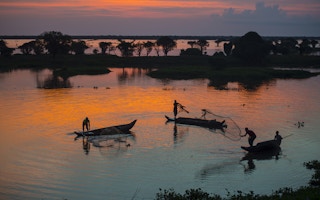US scientists report that lakes worldwide are warming by an average of more than 1°C every 30 years, faster than the warming rate of either the ocean or the atmosphere.
The warming is expected to increase algal blooms and to mean global emissions of methane, a greenhouse gas 25 times more potent than carbon dioxide over a century, will increase by 4 per cent over the next decade. Over a 20-year period, methane is 84 times more powerful than CO2.
The rapid warming of the lakes threatens freshwater supplies and ecosystems, the scientists report in their study, published in the journal Geophysical Research Letters. They say their study is the largest of its kind and the first to combine satellite temperature data and long-term ground measurements.
They monitored 235 lakes, representing more than half the world’s freshwater supply, for at least 25 years and found that they are warming by an average of 0.34°C each decade. Among the profound effects they say may follow is an increase in algal blooms.
The blooms, which can ultimately rob water of oxygen, are projected to increase by 20 per cent in lakes over the next century as warming rates increase. Blooms which are toxic to fish and animals would increase by 5 per cent. If these rates continue, the authors say, emissions of methane from the lakes will increase by 4 per cent by 2025.
Stephanie Hampton, of Washington State University, one of the study’s co-authors, said: “Society depends on surface water for the vast majority of human uses – not just for drinking water, but for manufacturing, for energy production, for irrigation of our crops. Protein from freshwater fish is especially important in the developing world.”
The authors say the temperature of water affects many of its other properties essential to the health and viability of ecosystems. When temperature swings quickly and widely from the norm, lifeforms in a lake can change dramatically and even disappear.
“These results suggest that large changes in our lakes are not only unavoidable, but are probably already happening,” saysCatherine O’Reilly of Illinois State University, the lead author of the study. Earlier research by Professor O’Reilly has seen declining productivity in lakes with rising temperatures.
Longer record
Another co-author, Simon Hook of NASA’s Jet Propulsion Laboratory, said satellite measurements provided a broad view of lake temperatures over the entire globe. But they measured only surface temperature, while hand measurements could detect temperature changes throughout a lake. And although satellite measurements went back 30 years, some surface measurements were more than a century old.
“Combining the ground and satellite measurements provides the most comprehensive view of how lake temperatures are changing around the world,” he said.
The researchers say various climate factors are associated with the warming trend. In northern climates lakes are losing their ice cover earlier, and many areas of the world have less cloud cover, exposing their waters more to the Sun. They say the greatest warming is occurring at high latitudes, as other climate warming studies have also found.
Tropical lakes may be seeing less dramatic temperature increases, but still enough to harm fish significantly. That can be particularly important in places like the African Great Lakes, where fish is an important source of food.

















